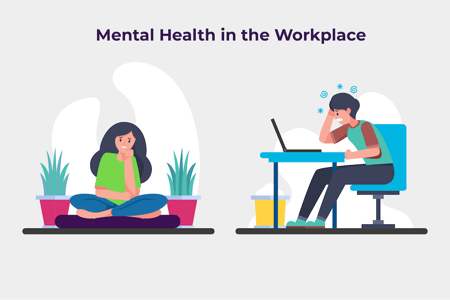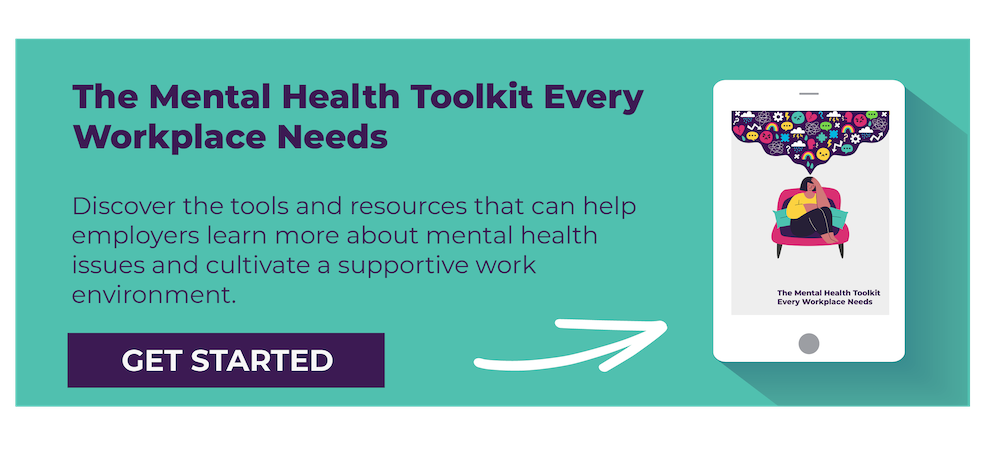 There’s no doubt we need to talk about mental health in the workplace a lot more.
There’s no doubt we need to talk about mental health in the workplace a lot more.
Even prior to the pandemic, researchers found mental health concerns increasing.
“We are beginning to see a significant impact on the mental health of everyday Americans as a result of the pandemic,” stated Dr. Anthony Hassan, Cohen Veterans Network President and Chief Executive Officer in an early 2020 press release. “Before the pandemic, there was already a mental health crisis in America, with high demand and relatively limited resources, the pandemic appears to be making it worse. And we know isolation can have negative consequences in terms of anxiety, depression, and suicidality.”
In the workplace, employers are likely to notice stress and anxiety levels rising. When workplace and life uncertainty arises, mental health concerns often follow for many individuals.
Luckily, there are ways to help your team stay on top of their mental health. Whether you start having more open workplace discussions or promote extra health programs, a combo of mental and physical health interventions can help.
Below, we share tips — including from a licensed clinical mental health counselor — on how to tackle the topic of mental health to destigmatize it and create a culture of mental wellness at work.
How Mental Health Impacts the Workplace
As defined by The US Department of Health and Human Services: “Mental health includes our emotional, psychological, and social well-being. It affects how we think, feel, and act. It also helps determine how we handle stress, relate to others, and make choices”
Although it isn’t talked about as openly as physical health, mental health plays a key role in overall well-being. If your employees aren’t taking care of their mental health, they may not be taking care of their physical health, either.
What’s even more damaging is those who know they need help but are afraid to get it because their employer may find out or they feel they may be judged.
Around 85% of employees’ mental health issues are undiagnosed or untreated, according to the National Alliance on Mental Illness. That may be in part due to the stigma that surrounds mental illness and that some individuals don’t know where to start searching for help.
That’s why it’s essential for employers to encourage the discussion of mental health in the workplace. Aside from making your company a healthier place to work, it has a domino effect on your employees both inside and outside of work. Better mental health means more confidence, energy, productivity, and overall happiness and well-being.
Mental health issues can negatively impact an employee’s:
-
- Productivity
- Engagement
- Communication
- Overall job performance
- Physical capability and daily functioning
For employers who think it’s a sadness that can be shaken off, consider this:
“Even after taking other health risks—like smoking and obesity—into account, employees at high risk of depression had the highest health care costs during the three years after an initial health risk assessment,” states the Centers for Disease Control and Prevention website.
One Counselor’s Workplace Mental Health Tips
So, how can employers help their employees tackle mental health?
With a willingness to tackle the tough topic in the first place, says Dr. Tasha Holland-Kornegay, a North Carolina-based licensed clinical mental health counselor dedicated to helping others find wellness in their own lives. Dr. Tasha Holland-Kornegay is also the founder of Wellness in Real Life (WIRL), a platform that connects healthcare professionals to exclusive wellness deals and services.
Below, she shares her insight on how employers can work together with their employees to create an open dialogue about mental health in the workplace.
Mental health concerns are on the rise. For many employers, this means new discussions and maybe even uncharted territory about mental health. How do employers tackle the topic of mental health in the workplace delicately?
That's a great question – for many business owners and employees, mental health seems like a personal concern, and as such, one that shouldn't be discussed at work. The truth of the matter is this: work has a considerable impact on employee mental health, and employee mental health has a considerable impact on their performance at work. In my opinion, this alone indicates that employee wellness should be a top priority for all businesses. However, that doesn't change the fact that in most businesses, speaking about mental health is taboo.
What does this look like in practice? Opening up workplace culture to encourage discussions about mental health is a good start. The key is to lead by example and give your employees plenty of opportunities to ease into discussions that were once considered taboo. This can create a much more accepting environment in which mental health is given more consideration.
What are some of your favorite strategies to help support employees with mental health concerns?
The key to bringing mental health awareness into the workplace is company culture. Changing company culture starts as a top-down issue, beginning with changes that management puts into action, but the lion's share of the work depends on employees. For instance, I think one of the best ways to break the mental health taboo in the workplace is also one of the simplest: just start talking about it.
To put this into action, I might have my employees gather for a meeting once a week and slowly phase in discussions about mental health. The success of this practice is somewhere in between how I put it into action and how receptive my employees were to it. Regardless, simply bringing mental health and wellness into the room for discussion will help slowly break down the sense that it's just not "right" to talk about.
There's a lot of stigma around mental health. How can employers play a role in making it easier to openly discuss it?
When it comes to creating a more accepting company culture, employees have the most power. It's management's job to steer them in the right direction, but how employees react is what lets them meet, exceed, or fall short of management's goals. It isn't hard to see why: the stigma around mental health is upheld by our peers and then internalized. If discussing mental health challenges leads to awkwardness or, worse, ridicule, then that nudges the workplace toward a more toxic culture. By encouraging your employees to be empathetic and listen, you can make sure the workplace is always moving in a positive direction.
What are some of the most effective programs or strategies you've seen used in workplaces when it comes to helping employees with mental health?
The type of solutions will be different for each workplace, but I think the most effective ones that I've seen share a few things in common: starting at the top, trusting employees, investing in education, and playing a supporting role. In other words, management should make their expectations known, model the behavior they want to see, and create opportunities for employees to engage in discussions about mental health. We should then trust our employees to handle the boots-on-the-ground work, and play a supporting role by providing the resources and education they need to be successful.
Do you have any favorite resources you recommend to others when it comes to mental health discussions or learning more about mental health issues?
When it comes to a topic as challenging and important as mental health, it's crucial to get your information from dependable sources. I urge business owners to seek out websites with high experiential or scientific standards. My favorite resource is Harvard Business Review since it not only conducts original research and presents its findings in everyday language but also pulls in important findings from across the industry. It's a great way to stay in-the-know!
Other Ways to Support Mental Health at Work
As an employer, you can offer a variety of solutions to support employees in achieving optimum mental health. The key is to get these types of offerings in place ASAP so employees can use them well before they might hit crisis mode.
Here are some simple ways to support employees:
- Offer pulse surveys - Just check in on your employees with a simple (anonymous) survey to see how they’re doing. Questions like: “In the last 14 days, have you felt down, sad, hopeless, or depressed?” can open the door to conversations about mental health or where your company may need to increase resources.
- Make mental health self-assessment tools available - Share self-assessment tools with all employees to help them gauge where they’re at with various mental health concerns. Mental Health America has a great range of free self-assessment tools.
- Use a mental health toolkit - Leadership can also work through a mental health toolkit for the workplace as well to get on the same page. Download The Mental Health Toolkit Every Workplace Needs right here.
- Provide free mental health services - Whether that means bringing on a counselor temporarily or highlighting specific mental health services in your healthcare package, make sure you let employees know what’s available through work.
- Host digital mental health seminars - Consider hosting seminars or workshops around depression and stress management techniques, like mindfulness, breathing exercises, and meditation. These can be invaluable to employees when it comes to learning how to minimize stress and worries in their lives.
Last but not least, most everyone can relate to taking care of and prioritizing their mental health. Rather than focusing only on how to treat a mental illness, encourage maintaining mental health and wellbeing. When addressing mental health in the workplace setting, emphasize achieving a healthy state of mental wellbeing is a common goal everyone desires and shares. It can make those suffering silently with mental health issues feel more inclusive and open up conversations much easier, too.
How does your company tackle mental health in the workplace these days? Share your thoughts in the comments below!
Design vector created by Freepik



